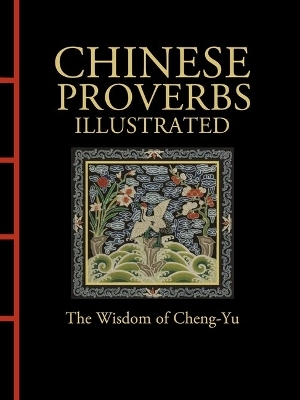
Chinese Proverbs Illustrated
Amber Books (Verlag)
978-1-83886-369-2 (ISBN)
The elegant pen-strokes and visual harmony of Chinese writing have long been admired in the west. Classical Chinese calligraphy is a popular and valuable art form, and with the increasing economic and cultural power of China, its writing is becoming more widely appreciated and understood. In particular, the deep layers of history and symbolism which exist behind even the most everyday phrases have a strong appeal to those seeking understanding from an alternative philosophy. The sayings known as Cheng-yu, represented by four characters, are used frequently in Chinese. They are comparable to proverbs or idioms in English, but each adds a depth of meaning and linguistic colour very unlike their English equivalents. Many are rooted in ancient Chinese culture, and make oblique references to poetry, philosophy or history. Four characters may take a whole paragraph to explain, yet, to a native speaker brought up and educated in the traditions to which they refer, they are instantly comprehensible. Chinese Proverbs Illustrated: The Wisdom of Cheng-Yu features a selection of the most famous and most interesting of the more than 5000 Cheng-yu. Alongside the phrase is an accessible and inspiring explanation, its literal translation in English, what the particular strokes symbolize, and its various uses, as well as over 75 images to complement the text.
James Trapp is the author of Chinese Characters: The Art and Meaning of Hanzi, Chinese Proverbs and also has translated a bestselling new multilingual edition of Sun Tzu’s The Art of War. A Chinese language graduate of the School of Oriental and African Studies (SOAS), University of London, he teaches Mandarin and was previously an Education Officer on the China Collection at the British Museum.
Contents include:
(Idiomatic or free English translation)
like father like son, chip off the old block
nothing good comes easy
honour among thieves
no smoke without fire
pride goes before a fall
strike while the iron is hot
offence is the best defence
a long night brings many dreams
you can’t undo what is done
greed and poverty are neighbours
free from responsibility free from care
you can’t make a silk purse out of a sow’s ear
in vino veritas
be above worldly considerations
face life’s troubles
justice will triumph
solid as a rock
naturally talented
make a valiant comeback
success through perseverance
face life’s troubles together
utmost courage
live by example; set yourself as the standard
murder will out
you reap what you sow
slow and steady wins the race
if you play with fire you’ll
get burnt
don’t let emotion cloud
your judgement
rats leaving a sinking ship
not see the big picture futile efforts
the end justifies the means
extreme danger
many hands make light work
same as above
pearls before swine learn from your mistakes
everything is relative
overegg the pudding, gilding the lily
a blessing in disguise
there’s no place like home
burn one’s bridges, cross the Rubicon
a leopard cannot change its spots
don’t put all your eggs in one basket
(Literal English translation, if different)
if the father is a tiger the son will be a tiger
no waves without wind
an arrogant army will always lose
water thrown out can’t be gathered back up
the character for greed is easily changed to the one for poor
rotten wood cannot be carved
ride the wind and break the waves
a righteous army is bound to win
move the mountain and rise again
dripping water pierces rock
wind and rain in the same boat
wade through boiling water and walk through fire
paper cannot wrap up fire
plant melons, harvest melons
an iron bar can be ground down to a needle
once you climb on a tiger
think your son clever but your neighbour suspicious
when a tree falls the monkeys scatter
a mouse only sees an inch
fish for the moon in a pond
forget about the rod when you’ve caught the fish
a mountain of knives and an ocean of fire
one tree does not make a forest
one string cannot make music
play a harp to an ox
gain knowledge by falling in a ditch
a foot can be short and an inch long
add legs to a painting of a snake
the old man loses his horse at the frontier*
fallen leaves return to the root, said of overseas Chinese returning home in old age
smash the pots and sink the boats
one’s true nature is hard to change
a clever rabbit has three tunnels
• Often, the proverbs themselves offer little clue to the meaning, and can only be understood if the background is known. For example, 塞翁失馬 (the old man loses his horse at the frontier) refers to an ancient story in which an old man loses his horse, but returns eventually with a second horse. Later, it throws the man’s son, who breaks his leg. At first this is a great tragedy, but later it allows him to dodge military conscription and avoid being caught in a terrible defeat in which he would have certainly died.
| Erscheinungsdatum | 05.04.2024 |
|---|---|
| Reihe/Serie | Chinese Bound Illustrated |
| Zusatzinfo | Halftones, color; Illustrations, color |
| Sprache | englisch |
| Maße | 196 x 265 mm |
| Gewicht | 790 g |
| Themenwelt | Sonstiges ► Geschenkbücher |
| Geisteswissenschaften ► Geschichte ► Regional- / Ländergeschichte | |
| Sozialwissenschaften | |
| ISBN-10 | 1-83886-369-9 / 1838863699 |
| ISBN-13 | 978-1-83886-369-2 / 9781838863692 |
| Zustand | Neuware |
| Haben Sie eine Frage zum Produkt? |
aus dem Bereich


